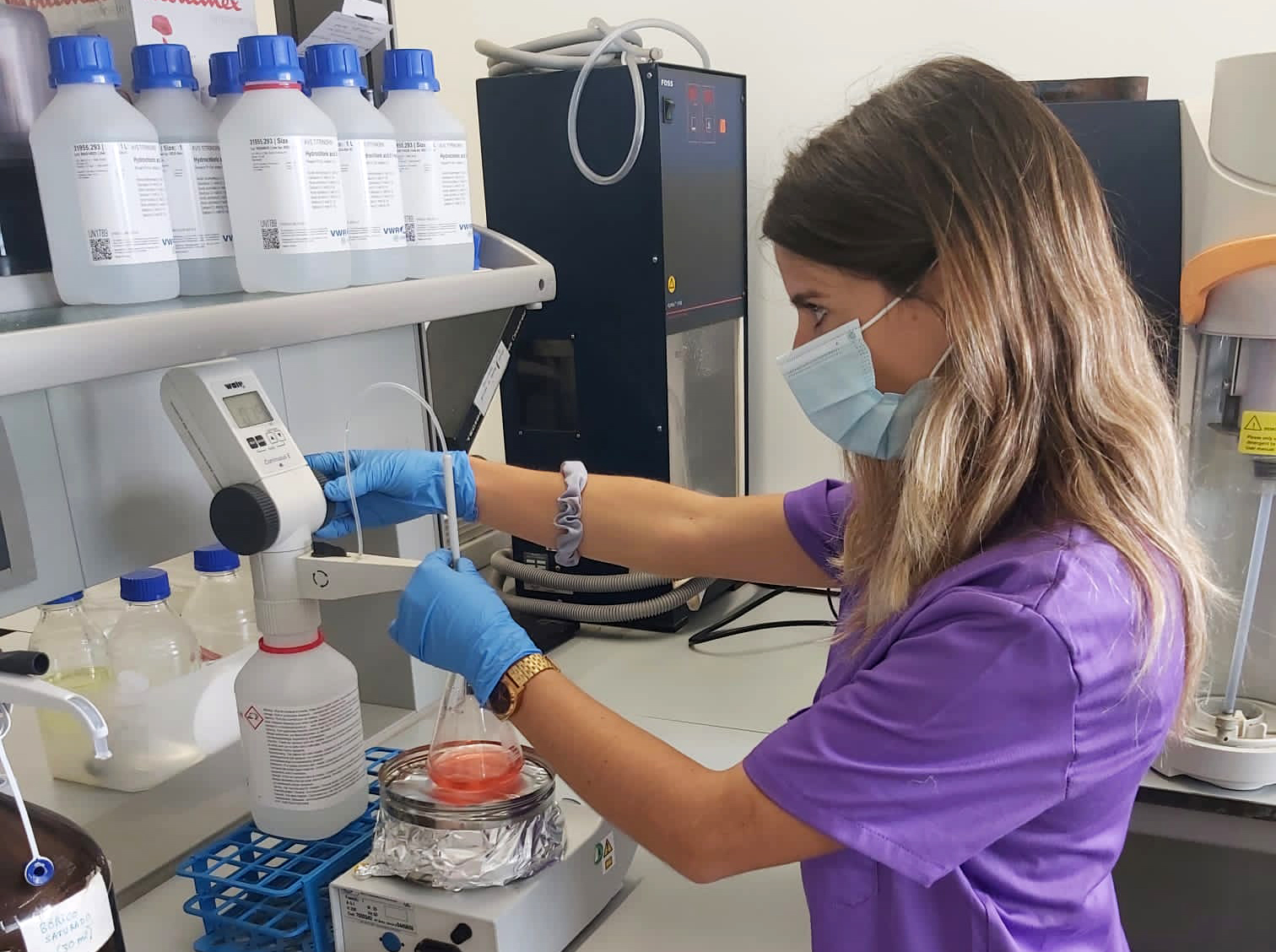The doctoral thesis of Marta Carvalho, of the Aquaculture Research Group of the University Institute ECOAQUA from the ULPGC, concludes that the incorporation of microalgae in the composition of feed increases the nutritional quality of sea bream and meagre.
The doctoral thesis of Marta Carvalho's researcher, who obtained a cum laude mark at the University of Las Palmas de Gran Canaria (ULPGC), concludes that microalgae can be a substitute of fish oil in the feed of Mediterranean farmed fish. Her research is very useful, since this alternative represents a high-quality source of lipids and omega-3 fatty acids, particularly EPA and DHA, that will help the production of more sustainable feed for marine aquaculture.

Photo of Marta Carvalho at the ECOAQUA facilities in Taliarte.
The study led by the Aquaculture Research Group of the University Institute of Sustainable Aquaculture and Marine Ecosystems (ECOAQUA) has been carried out with two important species for the Mediterranean aquaculture: gilthead sea bream and meagre. These studies are innovative in reducing the use of fishmeal and fish oil in aquaculture feeds, and aimed to eliminate fish oil inclusion in practical aquaculture feeds by using the microalgae derivatives studied.
The research concluded that the growth and health of the fish were not affected when replacing the total fish oil of the diets by microalgal products, whereas the contents of EPA+DHA, the most important omega-3 fatty acids for vertebrate nutrition, were increased compared to a control feed like the ones currently used in fish farming. In this sense, these feeds based on microalgae could enrich the nutritional value of fish aquaculture products, increasing the benefits associated to fish consumption for human nutrition at the same time that they are more environmentally and economically sustainable.
The study, that was presented on past 17th May 2022, was developed by the Portuguese student Marta Carvalho under the direction of the Vice-Chancellor for Research and Transfer of the ULPGC, Professor Marisol Izquierdo, and Professor Daniel Montero.

Photo of some members of the Aquaculture Research Group from IU-ECOAQUA and the examining board with Marta Carvalho after the defense of her thesis.
Furthermore, last week, Marta was awarded with the second award of the V Telefónica Chair Competition from the ULPGC, in the category of graduate, postgraduate or thesis projects.
The thesis titled "Innovative Feeds Based On Novel Omega-3 Sources To Improve The Production Of Mediterranean Fish" got an outstanding cum laude mark within the specialty of International Doctorate and was included in EU project PerformFISH, where ECOAQUA is one of the major participants.
Carvalho completed his bacherol’s and master's degree at the University of Oporto, her hometown. In the last year of her master's degree, thanks to an ERASMUS+ scholarship, she carried out the experimental research for her master’s thesis at the University Institute ECOAQUA from the ULPGC under the direction of Marisol Izquierdo. "The experience was so positive for both parties that I decided to begin the ACUISEMAR PhD program in 2017-2018 also under the direction of Professor Marisol Izquierdo and Professor Daniel Montero," explains the researcher.
In April 2018, Carvalho got two PhD scholarships, one coming from the Portuguese Science and Technology Foundation and the other from the Canary Islands Agency for Research, Innovation and Information Society (ACIISI), which was the one that she finally chose to fund her PhD studies.
The researcher was awarded the Global 'Women in aquaculture' scholarship in 2021, from among 200 applicants from all over the world. This recognition is awarded annually to two female scientists by the Nordic company Kvarøy Arctic, one of the largest sustainable salmon producers in the world, with the aim of supporting the presence and the role of women in the aquaculture sector.
Beatriz Díaz Ojeda. Mandarina Comunicación / 620410871 / beatriz@mandarinacomunicacion.es


